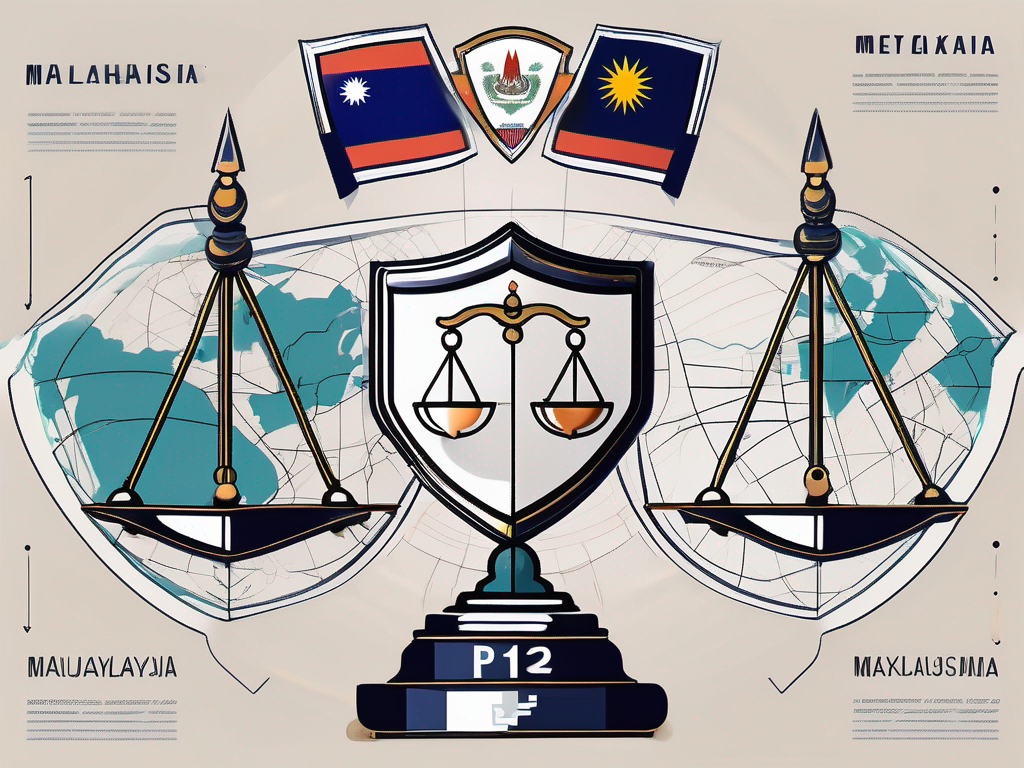Essential AML/CFT Guidelines for Financial Institutions in Malaysia
Contents
The fintech industry in Malaysia is undergoing rapid expansion, fueled by digital innovation, mobile adoption, and a thriving cashless economy. As the sector grows, so does the need for strong anti-money laundering compliance frameworks. With increasing risks tied to digital payments, peer-to-peer lending, and blockchain solutions, fintech firms must take a proactive stance on anti-money laundering compliance in Malaysia.
Non-compliance with Anti-Money Laundering (AML) and Counter-Financing of Terrorism (CFT) regulations can expose fintech companies to heavy fines, legal penalties, and reputational damage. This makes anti-money laundering compliance not just a regulatory requirement, but a strategic priority for fintechs operating in Malaysia’s evolving financial landscape.
This guide outlines Malaysia’s AML/CFT regulatory environment, the key risks fintechs must navigate, and the best practices they can adopt to maintain strong anti-money laundering compliance and safeguard the integrity of the financial system.
Malaysia's Economic Landscape
Malaysia is emerging as a vital financial hub in Southeast Asia, known for its diverse economy spanning manufacturing, services, and agriculture. This strong economic foundation has led to increased foreign investment and rapid fintech innovation. However, these developments also bring heightened exposure to financial crimes, making anti-money laundering compliance in Malaysia more important than ever for fintech companies and financial institutions.
The key vulnerabilities that threaten Malaysia’s financial ecosystem and highlight the need for robust anti-money laundering compliance include:
🔹 High Cash-Based Transactions – Informal sectors and cash-heavy businesses increase the difficulty of tracking financial activity.
🔹 Cross-Border Financial Flows – Malaysia’s active role in international trade and remittances creates channels that can be exploited for illicit fund movement.
🔹 Organized Crime Networks – Criminal enterprises take advantage of regulatory gaps to facilitate money laundering and terrorist financing.
🔹 High-Risk Sectors – Industries such as real estate, gaming, and luxury assets are commonly associated with financial crime risks and require stricter AML oversight.
For fintechs operating in Malaysia, understanding these systemic risks is essential. Implementing a proactive and adaptive approach to anti-money laundering compliance enables companies to mitigate threats, ensure regulatory alignment, and build long-term business credibility.
Malaysia’s AML/CFT Regulatory Framework
Malaysia maintains a comprehensive regulatory framework to ensure anti-money laundering compliance and combat terrorist financing. The framework is governed by the Anti-Money Laundering, Anti-Terrorism Financing, and Proceeds of Unlawful Activities Act 2001 (AMLATFPUAA), which sets out the legal obligations for financial institutions and fintech firms operating in the country.
To comply with AML/CFT laws in Malaysia, reporting institutions must implement risk-based compliance programs that include customer due diligence, transaction monitoring, suspicious activity reporting, and regular compliance reviews. These measures are central to maintaining strong anti-money laundering compliance across Malaysia’s financial ecosystem.
Key regulatory guidelines and frameworks include:
✅ AML/CFT & Targeted Financial Sanctions for Financial Institutions – Applicable to banks, insurers, and other licensed entities to implement risk-based AML programs.
✅ AML/CFT Guidelines for DNFBPs & Non-Bank Financial Institutions – Extends compliance expectations to lawyers, accountants, trust companies, and other non-financial businesses.
✅ AML/CFT Guidelines for Digital Currencies – Targets cryptocurrency exchanges and blockchain-based financial services.
✅ Risk-Based Capital Adequacy Framework for Virtual Banks – Designed to manage the financial crime risk associated with digital banks and fintech institutions.
This strong legal and regulatory foundation supports Malaysia’s efforts to meet international standards and promotes anti-money laundering compliance as a key pillar in building a secure and trusted financial environment.
Key AML/CFT Enforcement Bodies in Malaysia
To strengthen anti-money laundering compliance in Malaysia, several key enforcement bodies work together to monitor, regulate, and enforce AML/CFT standards across the financial and non-financial sectors. These agencies play an essential role in ensuring that institutions follow the laws and contribute to a secure and transparent financial system.
Key enforcement bodies include:
🔹 Bank Negara Malaysia (BNM) – As Malaysia’s central bank, BNM is the primary regulator for financial institutions and fintechs, overseeing anti-money laundering compliance and enforcing policy.
🔹 Financial Intelligence Unit (Unit Pelaporan Melayu – STRO) – The national FIU under BNM, responsible for collecting and analyzing Suspicious Transaction Reports (STRs) submitted by reporting institutions.
🔹 Royal Malaysia Police – Investigates financial crime offences, including fraud, terrorist financing, and money laundering.
🔹 Malaysian Anti-Corruption Commission (MACC) – Focuses on investigating corruption-related offences, including associated money laundering cases.
🔹 Securities Commission (SC) – Regulates Malaysia’s capital markets and ensures AML compliance among brokers, fund managers, and securities dealers.
🔹 Labuan Financial Services Authority (Labuan FSA) – Supervises offshore banks and international business transactions, ensuring cross-border anti-money laundering compliance.
Together, these agencies form a coordinated network that upholds Malaysia’s AML/CFT framework and supports the nation’s ongoing commitment to international anti-money laundering compliance standards.
Detailed Breakdown of AML/CFT Requirements in Malaysia
Malaysia's Anti-Money Laundering, Anti-Terrorism Financing, and Proceeds of Unlawful Activities Act 2001 (AMLA Act) sets clear expectations for anti money laundering compliance across both financial and non-financial sectors. Under this law, designated reporting institutions must follow strict AML/CFT procedures to detect and prevent illicit financial activity.
Entities required to comply with AML/CFT regulations include:
Financial Institutions:
✅ Regulated by the Financial Services Act 2013 and Islamic Financial Services Act 2013
✅ Includes banks, insurers, investment banks, financial advisers, and securities dealers
✅ Also includes insurance brokers, development financial institutions, and payment service providers
Non-Financial Businesses and Professions (DNFBPs & NBFIs):
📌 Regulated under the AMLA Act
✅ Lawyers, accountants, company secretaries, and trust companies
✅ Moneylenders, pawnbrokers, real estate agents, and leasing firms
✅ Casinos, gaming outlets, and dealers in high-value goods like precious metals and gemstones
Cryptocurrency & Digital Asset Service Providers:
✅ Regulated under the Capital Markets and Services Act 2007
✅ Includes crypto exchanges, token custodians, and digital advisory service providers
These reporting institutions must implement risk-based AML programs that meet Malaysia’s compliance standards and reinforce their commitment to anti money laundering compliance.
Core obligations include:
🔹 Customer Due Diligence (CDD)
🔹 Suspicious Transaction Reporting (STR)
🔹 Transaction Record-Keeping
🔹 Employee Training and Internal Controls
Meeting these expectations not only satisfies regulatory requirements but also helps organizations maintain trust and safeguard the integrity of Malaysia’s fintech-driven financial ecosystem.
Key AML/CFT Compliance Obligations in Malaysia
To maintain strong anti-money laundering compliance in Malaysia, reporting institutions must adhere to several critical obligations. These requirements are designed to help detect, deter, and report suspicious financial activities across various sectors.
Key AML/CFT compliance obligations include:
🔹 Customer Due Diligence (CDD) – Institutions must verify the identity of their customers and assess the risks associated with each client. This is a fundamental requirement for maintaining anti-money laundering compliance in Malaysia.
🔹 Suspicious Transaction Reporting (STR) – Entities are legally required to report any suspicious activity to Bank Negara Malaysia (BNM) to support proactive monitoring and enforcement.
🔹 Transaction Record-Keeping – Reporting institutions must retain detailed records of customer transactions and internal assessments for at least seven years.
🔹 AML Compliance Programs – Organizations must have formal internal policies, employee training programs, and independent audits to ensure ongoing compliance.
Cash Transaction Reporting (CTR) Requirements:
Certain institutions must also report any cash or e-money transactions of MYR 25,000 or more within a single day for the same account. This helps regulators monitor large currency movements and identify unusual patterns.
Entities required to submit CTRs include:
✅ Banking institutions
✅ Development financial institutions
✅ Lembaga Tabung Haji (Malaysia’s Pilgrimage Fund Board)
✅ Licensed casinos
Following these obligations enables financial institutions and fintech firms to comply with national and international AML standards while reinforcing their commitment to anti-money laundering compliance.
Compliance Program Requirements
To ensure consistent and effective anti-money laundering compliance in Malaysia, all reporting institutions are required to establish a robust internal compliance program. These programs must align with the requirements under the AMLA Act and support ongoing risk monitoring and regulatory readiness.
Key compliance program requirements include:
🔹 High-Integrity Hiring Practices – Institutions must assess the personal, financial, and employment history of employees involved in compliance-sensitive roles to uphold ethical standards.
🔹 AML Training Programs – Employees must be regularly trained on AML topics such as customer due diligence, suspicious transaction reporting, recordkeeping obligations, and internal escalation processes.
🔹 Independent Audit Function – Organizations must maintain an independent audit process to periodically evaluate the effectiveness of their AML compliance program.
🔹 Recordkeeping Procedures – Institutions must retain transaction-related documents, customer profiles, and risk assessments for a minimum of six years.
A well-structured compliance program helps prevent regulatory breaches, enhances employee awareness, and ensures that financial institutions and fintechs remain aligned with Malaysia’s anti-money laundering compliance framework.
Recordkeeping and Reporting Large Currency Transactions
An essential aspect of anti-money laundering compliance in Malaysia is the proper recordkeeping and reporting of large currency transactions. These practices help authorities trace financial activity and investigate potential money laundering or terrorist financing schemes.
Recordkeeping Requirements:
Reporting institutions must maintain complete and accurate records of:
🔹 Customer identification documents (e.g., ID cards, passports, incorporation papers)
🔹 Business correspondence and account files
🔹 Internal assessments and risk evaluations
🔹 Transaction data and supporting documentation
These records must be retained for a minimum of six years after the business relationship ends or after a transaction is completed. Institutions must ensure that records are detailed enough to reconstruct each transaction if needed for investigation or prosecution.
Currency Transaction Reporting (CTR):
Certain reporting institutions are required to submit a CTR to Bank Negara Malaysia if a customer conducts single or multiple cash or e-money transactions amounting to MYR 25,000 or more within the same account on a given day.
Entities required to report CTRs include:
✅ Licensed banking institutions
✅ Selected development financial institutions
✅ Lembaga Tabung Haji (Malaysia’s Pilgrimage Fund Board)
✅ Licensed casinos
Maintaining rigorous recordkeeping and CTR reporting standards is crucial for meeting regulatory expectations and strengthening anti-money laundering compliance throughout Malaysia’s financial sector.
Reporting of Suspicious Transactions
A cornerstone of anti-money laundering compliance in Malaysia is the obligation to report suspicious transactions. This includes both completed and attempted transactions that appear inconsistent with a customer’s known profile, behaviour, or source of funds.
Reporting Suspicious Transactions (STR):
Reporting institutions must file a Suspicious Transaction Report (STR) with the Financial Intelligence and Enforcement Department (FIED) of Bank Negara Malaysia. These reports play a key role in identifying potential money laundering or terrorism financing activities and enabling early regulatory intervention.
Required Information in an STR includes:
🔹 Details of the account holder or beneficial owner
🔹 Identity of the individual conducting the transaction
🔹 Transaction specifics (e.g., type, amount, purpose)
🔹 Description of suspicious behaviour or anomalies
🔹 Suspected offence and any relevant contextual information
Submission Methods:
✅ Email: str@bnm.gov.my
✅ Mail: Director, FIED, Bank Negara Malaysia, Jalan Dato' Onn, 50480 Kuala Lumpur
✅ FINS (Financial Intelligence System): Where applicable
Prompt and accurate STR submission is mandatory. Failure to comply may lead to regulatory penalties and weaken an institution’s anti-money laundering compliance posture.
By embedding STR reporting into internal workflows, fintechs and financial institutions can improve their ability to detect financial crime and ensure full alignment with Malaysia’s AML/CFT framework.
Customer Due Diligence and Enhanced Due Diligence in Money Laundering Compliance in Malaysia
Customer Due Diligence (CDD) and Enhanced Due Diligence (EDD) are core components of anti-money laundering compliance in Malaysia. These processes help institutions assess customer risks and ensure they are not inadvertently enabling financial crime.
Standard Customer Due Diligence (CDD) Requirements:
Under Malaysia’s AML/CFT regulations, reporting institutions must verify customer identities and evaluate the nature of the business relationship.
Key requirements include:
✅ Identity Verification – Use NRIC, passport, or official documentation
✅ Authorized Representatives – Verify the authority of persons acting on behalf of customers
✅ Beneficial Ownership – Identify the true owner(s) of the account or legal entity
✅ Business Relationship Assessment – Understand the purpose and expected nature of transactions
Information Required for Individual Customers:
🔹 Full name and aliases
🔹 ID/passport number, address, nationality, date of birth
🔹 Occupation, employer, contact details
For Legal Entities (e.g., companies or trusts):
🔹 Company name and legal structure
🔹 Incorporation documents, office address, nature of business
🔹 Details of authorized signatories and directors
Enhanced Due Diligence (EDD) for High-Risk Customers:
For high-risk customers such as Politically Exposed Persons (PEPs) or individuals from FATF-blacklisted jurisdictions, EDD measures are mandatory.
EDD requirements include:
✅ Collecting additional data – source of funds, wealth, financial background
✅ Ongoing transaction monitoring
✅ Senior management approval before onboarding or continuing relationships
Examples of high-risk customers:
📌 Domestic and foreign PEPs
📌 Clients from high-risk jurisdictions
📌 Customers with unclear or unverifiable sources of funds
Robust CDD and EDD practices are essential for protecting institutions from risk and ensuring full alignment with Malaysia’s anti-money laundering compliance standards.
Sanctions Screening & Compliance Obligations
Sanctions screening is a critical part of ensuring anti-money laundering compliance in Malaysia. It helps financial institutions and fintech companies prevent transactions involving individuals, organisations, or jurisdictions subject to international or domestic sanctions—especially those linked to terrorism financing.
Mandatory Sanctions Screening Requirements:
Reporting institutions must maintain up-to-date screening systems in alignment with:
🔹 The United Nations Security Council Resolutions (UNSCR) List
🔹 The Domestic List issued by Malaysia’s Ministry of Home Affairs
Key Compliance Obligations:
🔹 Customer Screening – Perform real-time and ongoing screening of new and existing customers against official sanctions lists
🔹 Transaction Screening – Monitor transactions to detect and block those involving sanctioned entities or high-risk jurisdictions
🔹 Asset Freezing – Immediately freeze assets upon identifying a sanctions match and report the incident to relevant authorities
Terrorism Financing Risk Management:
Institutions must also implement controls to detect, escalate, and report transactions suspected to be linked to terrorism financing. A positive match must trigger internal reviews and be reported to regulators without delay.
A well-structured sanctions screening and compliance program is essential not only to avoid financial, legal, and reputational risks but also to uphold strong anti-money laundering compliance in Malaysia.
Summary
As Malaysia’s fintech ecosystem continues to expand, maintaining strong anti-money laundering compliance is more important than ever. With increasing regulatory expectations and rising financial crime risks, fintech firms must embed robust AML/CFT measures into their operations.
By complying with Malaysia’s AMLA Act, conducting thorough risk assessments, and implementing proactive compliance frameworks, fintech companies can:
✅ Prevent regulatory penalties and reputational harm
✅ Strengthen investor and customer trust
✅ Detect and report suspicious transactions more effectively
✅ Support the long-term sustainability of the financial sector
Non-compliance can result in serious consequences, including fines, operational disruptions, and legal liabilities. That’s why anti-money laundering compliance in Malaysia is not just a regulatory checkbox—it’s a strategic imperative.
To thrive in this evolving environment, fintechs should invest in AI-driven monitoring, risk-based compliance programs, and a culture of integrity. Doing so not only protects their business but also contributes to a safer, more transparent financial ecosystem for all.
Related Posts
Time to reform your compliances
Kickstart your journey by exploring our products or book a demo with us.




